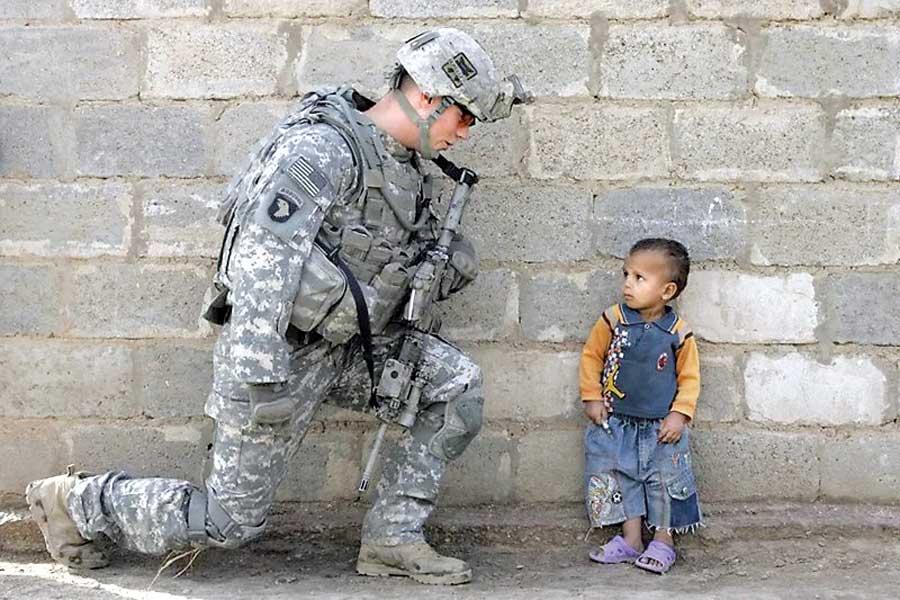Reply To:
Name - Reply Comment

A US soldier with an Iraqi child. AFP
As the Iraq war’s 20th anniversary is marked this week, it is time to take an audit of the evil nature of war. 
How it all began should be retold to remind the world how the high and mighty drunk with the power resorted to lies and deception to wage wars showing cruel disregard for the suffering of the people.
Didn’t Iraqi people cry when they lost their children, parents and their loved ones as the United States-led coalition launched its indiscriminate air attacks deceptively packaged as precision bombing? Since the war began on March 20, 2023, some 1,445,590 Iraqis have been killed. There is no war memorial either in Baghdad or Washington to remember these victims.
The Iraq war was not a war; it was a gargantuan war crime, the brutality of which can perhaps be found in historical parallels such as the Mongol invasions or Nazi Germany’s atrocities sans the Holocaust. Fallujah, Haditha, Hamandiya, Sadr City, Samarra and Ishaqi are not just names of Iraqi cities but places where the people’s screams, pains, agonies and fears are etched in every grain of sand.
As the 20th anniversary of the war is being marked, there is little mention in the ‘embedded’ US media of the then 14-year-old Iraqi girl in the village of Yousufiya near Mahmudiya. She was gang raped and killed by US soldiers on March 12, 2006, in her own house. They also killed her parents and her six-year-old sister. The girl’s two male siblings survived because they were in school at that time.
In the course of the war, the world was also shocked to learn that the soldiers of the world’s leading preachers of democracy and human rights could be perverts who had no qualms over resorting to torture that degrades human dignity. Confirming this are leaked pictures from the Abu Ghraib prison.
Then there was the use of banned depleted uranium as a weapon. It was the main cause of the unusually high number of deformed children being born in Fallujah.
War crimes committed in Iraq hardly came before a tribunal, international or otherwise. Most of the crimes were covered up by the Pentagon, while many who faced charges have been exonerated, according to the Global Policy Forum, a US-based independent think-tank.
If Russia’s President Vladimir Putin has been slapped with war crimes charges by International Criminal Court prosecutors for separating Ukrainian children from their parents in quick time, then why have they so far not charged the then US President George W. Bush and the then British Prime Minister Tony Blair?
Like Russia, the US is also not a signatory to the Rome Statute that established the ICC. The ICC’s double standards only give credence to allegations that the tribunal is nothing but a geopolitical tool of rich western nations. These nations perhaps believe that if they point to war crimes in developing countries, they could take the moral high road and divert international attention away from the stink in their cupboards and backyards.
Some 15 years after the start of the Iraq war, the ICC prosecutors did prepare a file to try US military officers accused of war crimes, but with the US imposing sanctions on the ICC prosecutors, the ICC surrendered its principles and put the case on the back burner
In a stricter sense, the war did not begin on March 20, 2003. The plan for the attack had been conceived long before Bush became the President in January 2000. The neoconservative (neocon) American think-tank, Project for New American Century, had long advocated military measures to preserve the US global domination. Like fish taking to water, Bush latched on to the PNAC strategy, no matter how immoral, unlawful, and unjust the might-is-right policy was.
Bob Woodward, the Watergate-fame investigative journalist, in a book he wrote, revealed that the plan for an Iraq attack was evident the very first day Bush started work in the Oval office. After his first cabinet meeting was over, he called his defence secretary Donald Rumsfeld to a side and told him to prepare a roadmap for an Iraq invasion. Bush was so obsessed with plans to invade Iraq that when his top security officials warned him of al-Qaeda’s plans to use civilian aircraft as missiles to hit US targets, he gave priority to the war on Iraq.
So when 9/11 took place, Bush was adamant that Iraq should be punished. But his advisors managed to dissuade him and urged him to attack Afghanistan first.
A year after the US-led war on terror began in October 2001, Bush began his campaign to shape the minds of the Americans for the Iraq war while they had still not recovered fully from the 9/11 shock.
Not many Americans were in the mood then to realise that what visited them on 9/11 was what the US had been visiting other countries for the past several decades. It was only last week, people in Vietnam marked the 55th anniversary of the My Lai massacre, one of the several 9/11s the Vietnamese experienced during their war for freedom. Some 500 innocent people including children, women, and the elderly were massacred by the US troops.
The American people overwhelmingly endorsed Bush’s plans to attack Iraq. No questions were asked when Bush used oratorical juggling to convince the American people that Iraq had links to the 9/11 terror. A poll conducted during the war showed that as many as 60 percent of Americans believed Bush’s lies. Others, including journalists, knew that Bush’s account had holes but chose not to ask questions.
Capitalising on the American people’s credulity, Bush accused Iraq of possessing weapons of mass destruction (WMDs) which he said posed a threat to American lives. Bush’s lapdog Blair tried to mislead the British people by claiming that Iraqi leader Saddam Hussein could within 45 minutes assemble his WMDs to attack Britain.
The assertions of UN weapons inspectors Hans Blix and Mohamed ElBaradei that there was no evidence of WMDs in Iraq made did not matter to the American people, who, months later, rewarded Bush with a second-term presidential election victory.
It is said the Bush team wanted to codename the war ‘Operation Iraq Liberation’, but the idea was dropped because of fears that its acronym ‘O.I.L.’ would expose their ulterior motive. The war began with a revised codename “Operation Iraqi Freedom.”
After 20 years, the American people and the rest of the world are still paying a huge price for the US$ 8 trillion war that failed to find a single WMD, the casus belli for the war. America’s wars are funded by borrowed money with interest and it would take decades to settle these state loans. While social security measures and the climate-change-reversing efforts suffered due to rich nations’ unwillingness to provide funds, Bush’s Iraq war made the arms industry, Big Oil, and construction companies richer and the world a less secure place by turning the cradle of civilisation into a factory of terrorism.